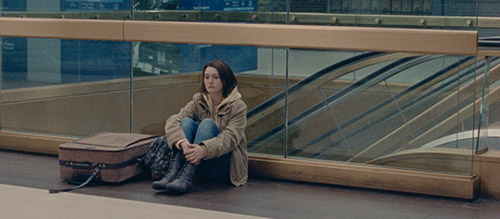
Never Rarely Sometimes Always (2020)
Director: Eliza Hittman
Screenwriter: Eliza Hittman
Starring: Sidney Flanigan, Talia Ryder, Théodore Pellerin, Kelly Chapman
“Don’t you ever just wish you were a dude?”
“All the time”.
Eliza Hittman’s Never Rarely Sometimes Always is a small, intimate slice of life story that takes on mountainous issues.
Set for release on digital platforms in the UK and Ireland on May 13th, Never Rarely Sometimes Always brings light to how and why a woman would seek an abortion.
Inspired by the story of Savita Halappanavar, a woman living in Ireland who was refused an abortion after an incomplete miscarriage (which lead to her death in 2012), Hittman’s film follows the story of seventeen year old Autumn (newcomer Sidney Flanigan), who discovers she is unintentionally pregnant.
Roe vs Wade was passed 47 years ago, but last year multiple US states faced a roll back of abortion laws and options for the women who live there. While it is estimated that 623,471 women in the United States received abortions in 2016, reproductive care is rarely a narrative that Hollywood has felt comfortable to explore in anything more than a subplot.
In what is perhaps an nod to regressive reproduction laws, the film surprisingly opens with a 1950s themed school talent show. We are introduced to Autumn when she takes the stage to cover “He Got the Power” by the Exciters. “He makes me do things I don’t want to do / He makes me say things I don’t want to say / And even though I want to break away,” she hauntingly croons, “He’s got the power / the power of love over me.”
Autumn lives in rural Pennsylvania and visits a local pregnancy crisis centre, quietly looking for help and guidance. She soon realises the centre is a lightly disguised anti-abortion clinic, and enlists the internet and her cousin Skylar (Talia Ryder) for help. Pennsylvania is currently one of 36 states which require a minor to have parental involvement and we see through Autumn’s distant relationship with her mother and step-dad that she must find another course of action.
Never Rarely Sometimes Always follows the two girls’ pilgrimage into New York to gain a legal abortion at a Planned Parenthood clinic in Manhattan. As Autumn climbs each rung of her journey’s ladder she is met with obstacles and short resources at every turn, included limited finances, accommodation and time.

Misogyny also litters their world on a daily basis. When she takes the stage in the talent contest she is heckled with “slut” by a boy at her school. Skylar palms off advances from an older customer at the local supermarket she works at with her cousin. After their shift the manager kisses their hands repeatedly as they pass him the money from the cash register. We see the casually embedded misogynistic language her step-dad uses while patting a dog, “you little slut, look how easy she is.”
At a brisk 95 minutes, no time is wasted on the backstory of how Autumn became pregnant, or who the father is. It isn’t relevant – what matters here is Autumn. Sidney Flanagan’s devastating debut performance is full of restraint, until it isn’t. The pivotal scene (and the one the film takes its name from) transpires when we see Autumn talk to a social worker in Manhattan. Her stoic attitude gives way as she painfully struggles to answer personal questions, mainly connected to her relationships and sex, with either “never” “rarely” “sometimes” or “always”. Hittman told The New York Times that to keep the authenticity of this scene it was shot at the Margaret Sanger Clinic (an operating Planned Parenthood in Manhattan). Kelly Chapman plays Social Worker #2, and is an actual counsellor that Hittman met while researching for the film.
Never Rarely Sometimes Always isn’t an easy watch, but it doesn’t need to be.
The rough atmosphere of New York City generated by guerrilla style camera work feels ultra-realistic and gives the small moments of tenderness and compassion between the women even more power.
Hittman succeeds through empathy and authenticity at departing from the stigma of what is a reality for many women. Reproductive care and rights are as divisive as ever under the Trump administration and normalising body autonomy has never been more important.
21/24
Written by Pagan Carruthers
Make sure to support Pagan in the following places:
Twitter – @PaganCarruthers
Letterboxd – /pagancarruthers

